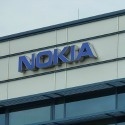Loss-making Nokia turns to Google Cloud in latest savings move
Finnish equipment giant will run its IT systems from the public cloud as it looks for ways back to profitability.

Nokia is the latest business to be sucked into the voracious maw of the public clouds. In a deal announced this afternoon, the Finnish equipment vendor was revealed to have handed responsibility for its IT systems to Google.
That will mean jettisoning its data centers and servers – and, presumably, the staff who manage them – and running IT infrastructure, along with various software applications, through Google Cloud.
The terms were not disclosed, except to say this is a five-year deal, but Nokia is anticipating "meaningful operational cost savings and efficiencies" as it cuts back on real estate, energy costs and hardware spending.
Figure 1:  Meet the new boss: Pekka Lundmark recently became Nokia's CEO.
Meet the new boss: Pekka Lundmark recently became Nokia's CEO.
The agreement marks the latest cost-saving move by the Finnish company, which recorded a €16 million (US$18.9 million) net loss (according to International Financial Reporting Standards) for the first six months of the year, despite sales of about €10 billion ($11.8 billion).
Nokia is trying to slash costs by €500 million ($587 million) this year, compared with the figure in 2018, and cut its headcount by nearly 5,000 roles last year in an efficiency drive.
With a workforce that comprised an average of 98,322 employees last year, it confirmed in June plans for another 1,233 job cuts in France.
The company had previously aimed for about €700 million ($822 million) in cost savings between 2018 and 2020 but was forced to lower targets after its 5G product business ran into problems.
Nokia appears to have turned an important corner, recently announcing 5G contracts with the UK's BT as well as Orange and Proximus in Belgium, but only after committing additional resources to 5G research and development.
In its statement, Nokia said its agreement with Google would allow it to make a rapid exit from its own IT data centers and that it expects to complete the entire shift over the next 18 to 24 months.
Alarm bells
The move comes with most of Nokia's employees still working from home to minimize the risks associated with coronavirus.
But it may ring the usual security alarm bells for those concerned about storing data in public clouds, while others will undoubtedly worry that a small number of US "hyperscalers" are taking control of critical IT systems.
Google competes against Amazon Web Services and Microsoft Azure in that market, and all three have been making inroads into the telecom sector – usually through tie-ups with service providers rather than equipment manufacturers.
Google Cloud was the fastest-growing part of Alphabet, Google's parent company, for the first six months of this year, when its sales rose 47%, to nearly $5.8 billion.
On the Nokia deal, Google said it would rely on systems integrators and other specialists to guarantee a "stable migration" of the Finnish company's IT systems.
Want to know more about 5G? Check out our dedicated 5G content channel here on Light Reading.
"We are excited to help Nokia revamp its IT infrastructure with our backbone network and our approach to data security, using advanced software-defined networking," said Rob Enslin, the president of Google Cloud, in a statement.
Investors will be keen to learn what the arrangement means for Nokia's profitability amid lingering questions about long-term strategy and portfolio commitments.
Nokia's share price has lost about half its value in the last five years following a €15.6 billion ($18.3 billion, at today's exchange rate) takeover of rival Alcatel-Lucent that has not lived up to its billing.
Rajeev Suri was recently replaced in the CEO role by Pekka Lundmark, formerly CEO of energy giant Fortum and previously a Nokia employee.
Analysts have been waiting on news of a different strategy under Lundmark and there has been speculation he could sell assets or pursue merger activity.
Related posts:
— Iain Morris, International Editor, Light Reading
Read more about:
EuropeAbout the Author(s)
You May Also Like




_International_Software_Products.jpeg?width=300&auto=webp&quality=80&disable=upscale)







